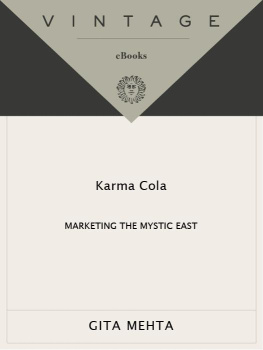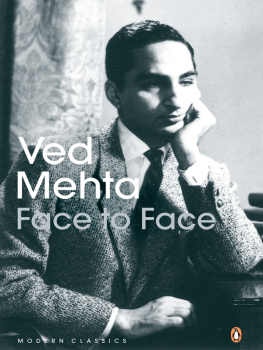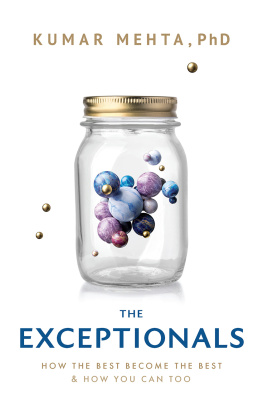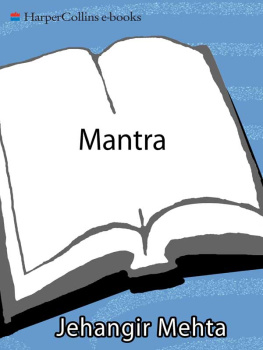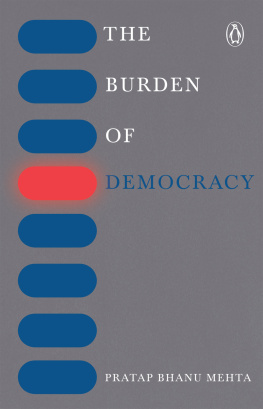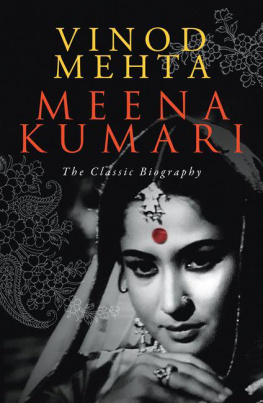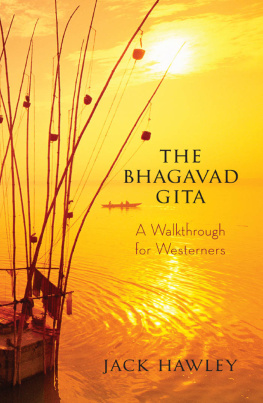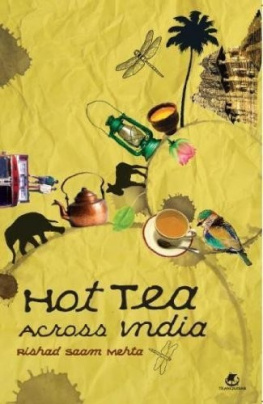GITA MEHTA
Karma Cola
Gita Mehta is the author of two other books, A River Sutra and Raj . She has written, produced, and directed a number of documentaries for American, British, and European television companies and has written for several publications. She is married, with one son, and divides her time among India, England, and the United States.

Books by GITA MEHTA
A River Sutra Karma Cola Raj


FIRST VINTAGE INTERNATIONAL EDITION, JULY 1994
Copyright 1979 by Gita Mehta
Introduction copyright 1990 by Gita Mehta
All rights reserved under International and Pan-American Copyright Conventions. Published in the United States by Vintage Books, a division of Random House, Inc., New York. Originally published in hardcover by Simon & Schuster, New York, in 1979. This edition published in Great Britain by Minerva/William Heinemann Ltd., London, in 1990, and in the United States by Ballantine Books, a division of Random House, Inc., New York, in 1991.
Portions of this work originally appeared in Harpers magazine.
Library of Congress Cataloging-in-Publication Data
Mehta, Gita.
Karma Cola: marketing the mystic East/Gita Mehta.1st Vintage International ed.
p. cm.
Originally published: New York: Simon and Schuster, 1979.
eISBN: 978-0-307-81463-0
1. IndiaDescription and travel. 2. Visitors, ForeignIndia. 3. GurusIndia. I. Title
DS414.M378 1994
954.04dc20 93-44992
v3.1
CONTENTS
INTRODUCTION
Among the letters I have received from readers of Karma Cola , the one that continues to haunt me was written by a young woman incarcerated in a home for the insane in the United States.
The writer described herself as having been among the hundreds of thousands of Westerners who traveled to India in the belief that they would find holy men able to free them from the boredom and despair of an increasingly material world. Soon after her arrival, while walking down an Indian street, the young woman encountered a man clothed in the saffron robes of renunciation who offered to be her spiritual mentor. Delighted that enlightenment was already within her reach she became his follower, following him even into a cave in the high Himalayas where, she was told, other spiritual gurus were waiting to initiate her in the ways of Eastern mysticism. Then her initiation began. The gurus gave her food laced with drugs. When she was incapacitated, they sexually assaulted her. For weeks she was kept a drugged sexual prisoner by her teachers, until she managed to escape and find her way back to the United Stateswhere she was promptly hospitalized as mad. Now she was in the process of securing her release from hospital, able at last to laugh at herself. Because, she wrote, after reading your book I realized I should never have trusted gurus who wore Adidas running shoes.
When Karma Cola was first published, critics from as far afield as the United States and South America to Europe and Southeast Asia, reviewed it less for its merit than as an occasion to describe their own encounters with such casualties of spiritual tourism. The tales the critics told could easily have been added to the original text, further illustrations of the price paid by those who confused the profound with the banal in their attempts to levitate above reality. And yet, those days seem now an age of such innocencewhen global escapism masquerading as spiritual hunger resulted at worst in individual madness, at best in a hard-won awareness that the benediction of jet-stream gurus was seldom more than skywriting, and that the mystic East, given half a chance, could teach the West a thing or two about materialism.
But even at that time, the international press was carrying lurid accounts of an event which proved to a shocked world that the sleep of reason, beyond giving birth to monsters, could end most monstrously in the Big Sleep itself. In Jonestown, on the instructions of their spiritual leader, more than a thousand people had just killed themselves by drinking cyanide mixed with the soft drink, Kool Aid: a karma attained through grape-flavored cola.
Such tragedies, from those distant days when rock and roll was still king, continue to cast a shadow over the pleasure one might take in the larger ironies of today, such as the irony in the Soviet Unionthe state which most emphatically attacked religion as the opiate of the masseswhere Russian members of the Hare Krishna sect now chant Hindu mantras on the streets of Moscow, citing glasnost as the reason to be accorded recognition as an official religion.
Since East and West increasingly meet under such unlikely circumstances it might be wise to remember two mythsone Eastern, one Westernwhich provide a caution to the human race. The Indian myth maintains we are living in the age of Kalyug, which presages the end of the world. Kalyug is characterized by speed. Speed, being the enemy of reflection, will spread fantasy with such velocity that humans, in their pursuit of escape, will ultimately destroy themselves. The Western myth, as expressed in Goethes Faust , introduces the devil as a poodle, welcomed as something harmless and amusing until it turns into the implacable force that exacts damnation as the price of greed.
Who can deny that this is indeed the age of speed if the psychedelic escapisms, the mindless pursuit of chemical and religious narcosis, the greed for supernatural powers, which entered our experience with all the playfulness of a poodle only three decades ago, have already turned into a Faustian nightmare in which fundamentalist priests become bounty hunters, drug barons hold whole nations to ransom, and saffron-robed holy men now deal in arms? And could the vague spiritual longings of those recent times undergo such rapid metamorphosis unless assisted by that powerful alchemy that turns doubt into certainty, the illusion of imminent paradise promised by marketing?
An Indian journalist told me of an interview she conducted with the members of a commune who styled themselves the Stone Age Cult. This group of Westerners had given up everything to follow a large, bearded American living in India who claimed to have discovered the secret of immortality. Unfortunately, immortality had not saved him from falling prey to the temporal and he had contracted an Indian disease. While his followers waited for his recovery, the immortal one died. The Indian journalist called on the bereaved followers and found, to her surprise, that they were not in the least distraught. When she enquired after their current views on immortality, they replied that their faith in their leaders indestructibility remained intact.
But hes dead, the bemused journalist insisted. You cremated him yourselves.
The master isnt dead, she was admonished. Hes being recycled.
The sages who prophesied Kalyug did warn that speed would lead to a marked preference for fantasy over reality. So if the tenor of the times suggests that we should see no reality, hear no reality, speak no reality, then perhaps a minutes silence should be observedif only to contemplate the perils of being recycled. In India, recycling offers not the glamours of immortality but the fetters of karma that chain humans to the wheel of existence. And even the most materialistic Indian still knows that wheeling and dealing in karma can turn into the most dangerous practical joke of all.
Gita Mehta ,
Delhi, December 1989
I
REINVENTING THE WHEEL
A Brazilian and a Frenchman once invited me to visit them in their bug-infested hotel room in the walled city of Old Delhi.
Next page
